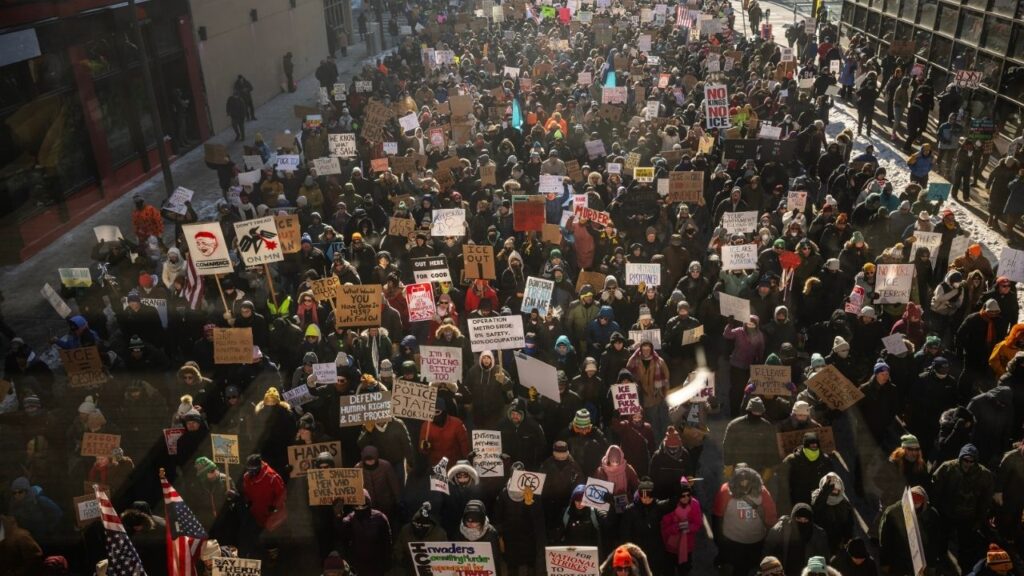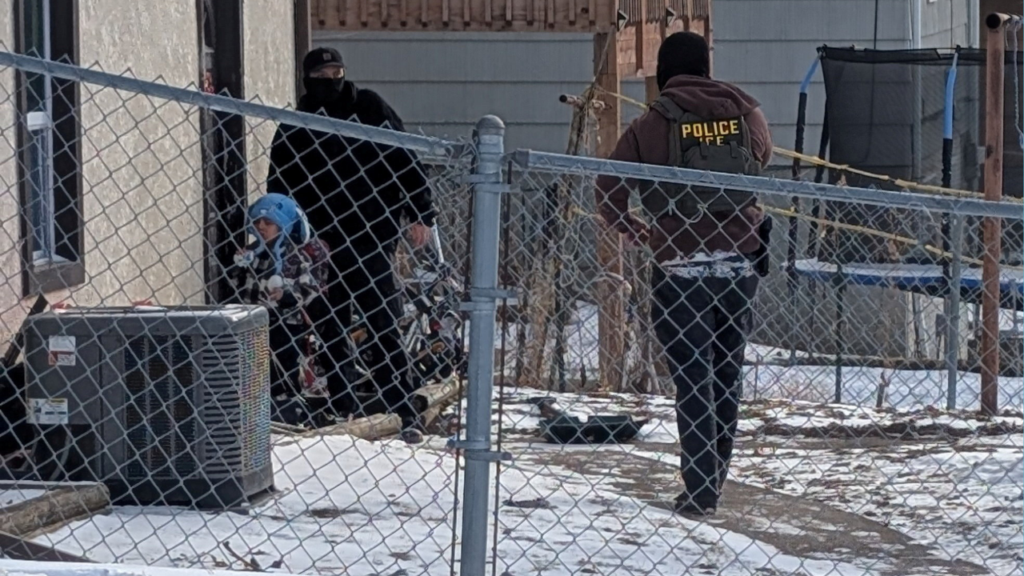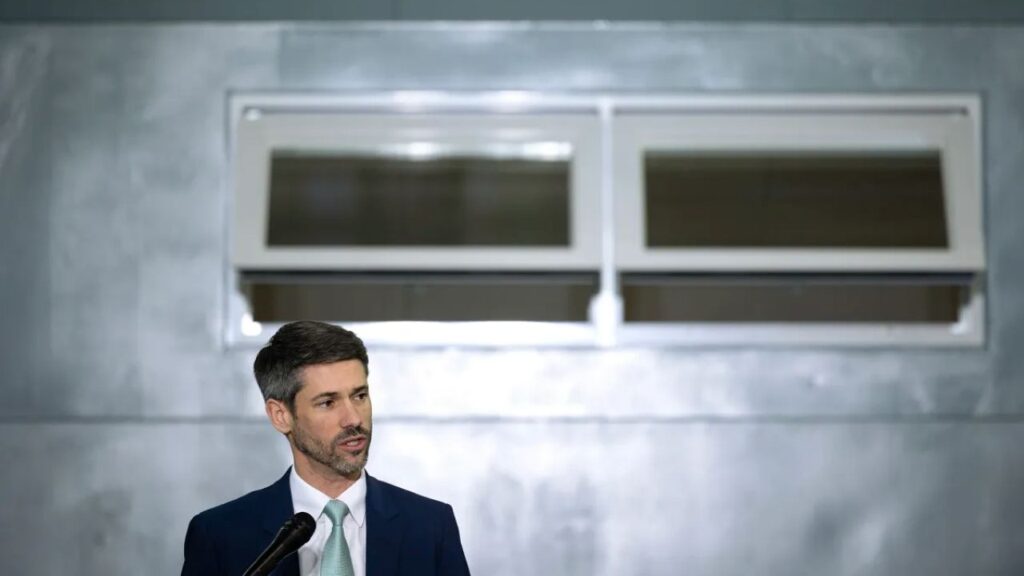Share
ATLANTA — Prosecutors brought murder charges Wednesday against the white Atlanta police officer who shot Rayshard Brooks in the back, saying that Brooks was not a deadly threat and that the officer kicked the wounded black man and offered no medical treatment for over 2 minutes as he lay dying on the ground.
Brooks was holding a stun gun he had snatched from officers but was running away and was 18 feet, 3 inches from Officer Garrett Rolfe when Rolfe opened fire, District Attorney Paul Howard said in announcing the charges five days after the killing outside a Wendy’s restaurant rocked a city — and a nation — already roiled by the death of George Floyd in Minneapolis late last month.
“I got him!” the district attorney quoted Rolfe as saying.
The felony murder charge against Rolfe, 27, carries life in prison or the death penalty, if prosecutors choose to seek it. He was also charged with 10 other offenses punishable by decades behind bars.
“We’ve concluded at the time that Mr. Brooks was shot that he did not pose an immediate threat of death,” Howard said.
A second officer with Rolfe, Devin Brosnan, 26, stood on a wounded Brooks’ shoulder as he struggled for his life, Howard said. Brosnan was charged with aggravated assault and other offenses.
The district attorney said Brosnan is cooperating with prosecutors and will testify, saying it was the first time in 40 such cases in which an officer had come forward to do so. But an attorney for Brosnan emphatically denied he had agreed to be a prosecution witness and said he was not pleading guilty to anything.
A lawyer for Brooks’ widow cautioned that the charges were no reason to rejoice.
“We shouldn’t have to celebrate as African Americans when we get a piece of justice like today. We shouldn’t have to celebrate and parade when an officer is held accountable,” said attorney L. Chris Stewart.
Brooks’ widow, Tomika Miller, said it was painful to hear the new details of what happened to her husband in his final minutes.
“I felt everything that he felt, just by hearing what he went through, and it hurt. It hurt really bad,” she said.
Rolfe was fired after the shooting Friday night, while Brosnan was placed on desk duty.

Rolfe’s Lawyers Issued a Statement Saying the Officer Feared for His Safety
The killing sparked new demonstrations in Georgia’s capital against police brutality, after occasionally turbulent protests over Floyd’s death had largely simmered down. Atlanta Police Chief Erika Shields resigned less than 24 hours after Brooks died, and the Wendy’s restaurant was burned.
Ahead of the district attorney’s announcement, Rolfe’s lawyers issued a statement saying the officer feared for his safety and that of others around him and was justified in shooting Brooks. Rolfe opened fire after hearing a sound “like a gunshot and saw a flash in front of him,” apparently from the Taser.
“Mr. Brooks violently attacked two officers and disarmed one of them. When Mr. Brooks turned and pointed an object at Officer Rolfe, any officer would have reasonably believed that he intended to disarm, disable, or seriously injure him,” the lawyers said.
But the district attorney said the Taser that Brooks held had already been fired twice and was thus empty and no longer a threat.
Brosnan’s lawyer, Amanda Clark Palmer, said the charges against him were baseless. She said Brosnan stood on the wounded man’s hand, not his shoulder, for a short period of time — seconds — to make sure Brooks did not have a weapon.
About 50 demonstrators were gathered in the parking lot of the restaurant — now a burned shell with “RIP” and “Rayshard” spray-painted on it — as the charges were announced. The news prompted a few raised fists.
Police had been called to the restaurant over complaints of a car blocking the drive-thru lane. An officer found Brooks asleep behind the wheel of the car, and a breath test showed he was intoxicated.
Police body camera video showed Brooks and officers having a relatively calm and respectful conversation — “almost jovial,” according to the district attorney — for more than 40 minutes before things rapidly turned violent when officers tried to handcuff him. Brooks wrestled with officers, snatched one of their stun guns and pointed it at one of them as he ran through the parking lot.
An autopsy found that he was shot twice in the back. One shot pierced his heart, the district attorney said. At least one shot went into a vehicle that was in line at the Wendy’s drive-thru.
The District Attorney Said Rolfe and Brosnan Were Given Until 6 P.M. Thursday to Surrender
After Brooks was shot, he was given no medical attention for over 2 minutes, despite Atlanta Police Department policy that says officers must offer timely help, Howard said.
The district attorney said Rolfe and Brosnan were given until 6 p.m. Thursday to surrender. He said he would request $50,000 bond for Brosnan and would ask that Rolfe be held without bail.
The charges reflect a potential “sea change” in tolerance for violence by police, said Caren Morrison, a Georgia State University law professor who used to be a federal prosecutor.
Morrison said the view until now has generally been that officers are justified in using deadly force in a case such as this one in which the suspect had a Taser or other weapon that could cause “grievous bodily harm.”
In the Minneapolis case, Derek Chauvin, the officer who put his knee on Floyd’s neck for several minutes as he pleaded he couldn’t breathe, has been charged with murder. Three other officers have been charged with aiding and abetting.
Wednesday’s decision in Atlanta comes as the country is experiencing a dramatic shift in its opinions on policing and race. A new poll by The Associated Press-NORC Center for Public Affairs Research finds that more Americans today than five years ago believe police brutality is a very serious problem that too often goes undisciplined and unequally targets black Americans.
In Washington, Senate Republicans announced the most ambitious GOP police-reform package in years, including an enhanced use-of-force database, restrictions on chokeholds and new commissions to study law enforcement and race.
The bill is not as sweeping as a Democratic proposal set for a House vote next week, but it shows how swiftly the national debate has been transformed since Floyd’s death.
Elsewhere around the country, the University of Nevada, Las Vegas removed a statue of its “Hey Reb!” mascot outside its alumni center, and Houston officials took down a figure of a Confederate soldier in a downtown park.
As for Quaker Oats’ decision to drop Aunt Jemima, the character’s image on packages was changed in recent years to make her look like a modern housewife, but for most of her existence she was a stout, kerchief-wearing black woman who evoked the plantation-era “Mammy” stereotype.


















